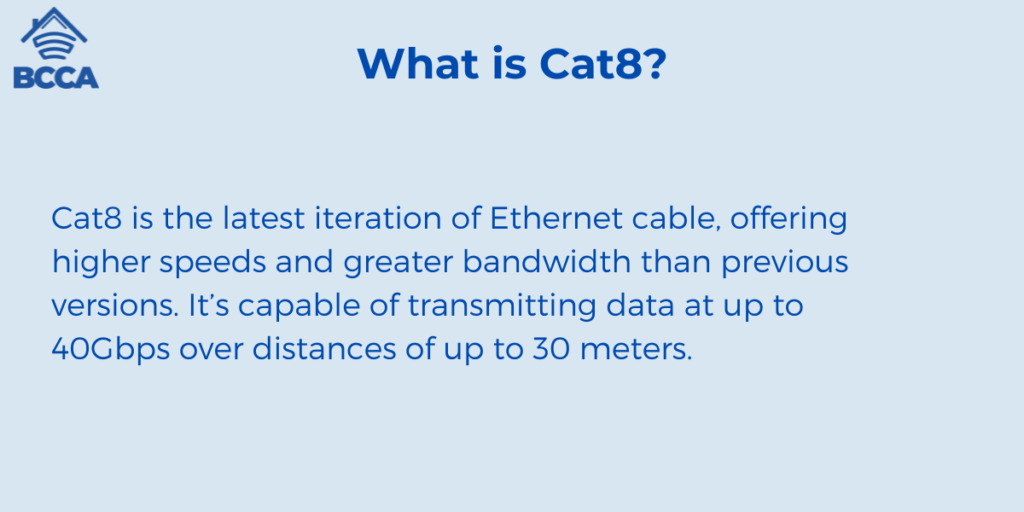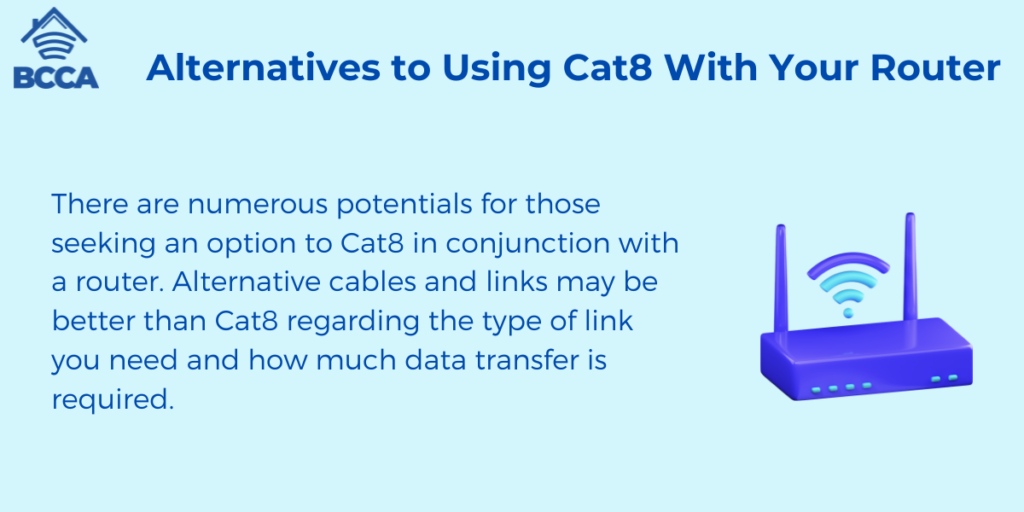Are you looking for the best way to boost your home or office network performance? If so, you may be wondering, “will Cat8 work with my router?” Cat8 is a relatively new Ethernet cable that offers faster speeds and better signal stability than its predecessors.
In this post, we’ll examine Cat8’s compatibility with routers and its advantages/disadvantages compared to other options, plus provide alternative solutions if it’s not suitable. So read on to learn more to finally answer the question: “Will Cat8 work with my router?
Table of Contents
What is Cat8?

Cat8 is the latest iteration of Ethernet cable, offering higher speeds and greater bandwidth than previous versions. It’s capable of transmitting data at up to 40Gbps over distances of up to 30 meters.
Cat8 is perfect for households and businesses that require a fast, dependable connection between multiple gadgets. Cat8 cables are also backward compatible with all earlier categories of Ethernet cable, so you can still use them even if your equipment isn’t designed for Cat8 yet.
The main benefit of using Cat8 cables is speed. With a maximum transfer rate of 40Gbps, they offer significantly faster performance than their predecessors (Cat7 and Cat6a).
They also have better noise immunity thanks to improved shielding and insulation materials, making them less susceptible to interference from other electronics or environmental factors like temperature changes.
Additionally, because they support frequencies up to 2000MHz instead of just 500MHz like older cables do, they allow for more efficient communication between devices connected by the same network—meaning faster response times when accessing data or streaming content online.
Cat8 is a cutting-edge cabling solution that provides exceptional data transfer performance and dependability. With this in mind, it’s crucial to understand router compatibility when considering Cat8 as an option for your network setup.
Compatibility with Routers
When assessing router compatibility with Cat8, several essential elements must be considered. Verify that the router can handle a 10 Gbps data rate to ensure compatibility with Cat8.
Second, ensure your router is compatible with Cat8 cables and connectors – some routers may only work with specific types of cabling.
Finally, check that your current internet plan has enough bandwidth for a Cat8 connection; otherwise, you may need an upgrade or a new service provider.
Choosing the right router for Cat8 can be tricky due to the high-speed requirements needed for this type of cable. Consider features like dual-band Wi-Fi and MU-MIMO tech to guarantee fast data transmission speeds over extended ranges when looking for a suitable model.
Additionally, pay attention to any special offers or discounts offered by retailers when purchasing routers specifically designed for use with Cat8 cables, as these can often save you money in the long run.
Finally, troubleshooting tips should always be kept handy when connecting your router via Cat8 cable, as even minor issues can cause significant problems down the line if left unchecked.
Check all ports on both devices before making any connections and confirm that all wires are securely connected at each end before powering up either device.
If possible, try using different cables or switching ports on either side of the connection until you find one that works correctly; this could save time and effort in finding a solution later on.
It is important to understand your router’s compatibility with Cat8 before making a purchase decision. Considering the pros and cons of utilizing Cat8 to link gadgets to your router should also be taken into account when making a purchase decision.
Advantages and Disadvantages of Using Cat8 with Your Router
Cat8 is the latest category of Ethernet cables and is becoming increasingly popular due to its high speeds, low latency, and improved signal quality. Cat8 offers numerous benefits when weighed against other cable connections.
When deciding whether Cat8 should be utilized with your router, several elements must be taken into account.
The primary benefit of using Cat8 with your router is the increased speed and bandwidth that it provides. With Cat8’s maximum data rate being 10Gbps over 100 meters (328 feet), it can easily handle large amounts of traffic without experiencing any slowdowns or lag time.
This makes routers ideal for streaming HD video content or playing online games where fast response times are essential. Additionally, because Cat8 has lower levels of interference than traditional cables, you can expect better signal quality as well as more reliable connections overall.
Yet, before opting for Cat8 in your home network setup, some potential drawbacks should be taken into account. The most obvious one is cost; while Cat 8 cables may offer superior performance compared to other types of cabling solutions, such as coaxial cable or fiber optics, they tend to come at a higher price point due to their relatively new technology status on the market today.
Furthermore, installation costs can also add up quickly if you don’t already have an existing ethernet infrastructure in place since running new wires through walls and ceilings will require professional help from an electrician or IT technician who specializes in this area.
Finally, keep in mind that although the current version (Cat 8) offers improved performance compared to previous generations like CAT6a/b/c/d/e, etc., newer versions such as CAT9 might eventually become available down the line, which could potentially render older models obsolete over time.
Therefore, it is important to consider how much money you want to invest upfront now versus waiting until later down the road for further advancements before investing again.
Alternatives to Using Cat8 With Your Router

There are numerous potentials for those seeking an option to Cat8 in conjunction with a router. Alternative cables and links may be better than Cat8 regarding the type of link you need and how much data transfer is required.
In this article, we’ll explore some of these alternatives and compare their advantages and disadvantages compared to using Cat8 with a router.
Fiber optics offer a higher speed connection than copper-based cables such as Cat5 or Cat6 and also have improved resistance to interference from external signals.
Fiber optics also have better resistance to interference from other signals, such as radio waves or electromagnetic fields. The cost may be a hindrance, making it not the ideal choice for some scenarios.
Wi-Fi is a viable option as opposed to Cat8 with a router because it employs radio signals instead of cables for data transmission in close proximity. This makes it ideal for connecting multiple devices within the same home network without having to run cables through walls or ceilings.
However, interference from other nearby networks or sources of RF radiation, such as microwaves and cordless phones, can cause signal strength drops off quickly due to fading caused by obstructions in the line of sight between two points needing connectivity.
Powerline networking technology is a viable alternative to Cat8 with a router, as it transmits data at high speeds of up to 500 Mbps (megabits per second) through existing electrical wiring inside homes and buildings.
This makes installation easy since no extra cabling needs to be installed; however, performance can vary depending on the quality of your home’s electrical wiring system and any potential noise generated by appliances plugged into the same circuit as your powerline adapters.
If too many appliances are connected simultaneously, sharing one circuit breaker panel output bus bar/breaker busses, this will reduce throughput speed significantly and impede reliability when attempting HD streaming video content delivery services such as Netflix or Hulu.
Satellite Internet access provides another solution, but it has certain limitations. Due to the long distances traveled before reaching its destination, latency issues can arise, and upload times may be slow, which makes downloading large files a challenge unless you have an unlimited data plan offered by many providers today.
Additionally, during heavy rain storms, transmissions may be blocked entirely, resulting in outages that could last for hours until service resumes once skies clear up again, making satellite internet unreliable for mission-critical applications requiring consistent, reliable uptime 24/7/365 days per year.
FAQs in Relation to Will Cat8 Work With My Router
Yes, Cat 8 cable is compatible with any router. Cat 8 has a higher bandwidth than its predecessors, making it suitable for activities that require high speed, such as gaming or streaming video, and offers improved protection from interference.
Additionally, its shielding provides greater protection from interference compared to other cables.
However, to take advantage of these features, you must have both an appropriate router and modem that are also capable of supporting Cat 8 connections.
The answer to the question, “Is my modem compatible with Cat8?” depends on your modem model. Generally, modems are not designed for use with Category 8 (Cat8) cables and do not support them.
To determine if your modem is compatible with Cat8 cabling, you must consult the manufacturer’s specs or contact their customer support.
Cat 8 cable is not overkill in certain applications. For example, if you need a high-speed connection for data transfer or gaming with the latest technologies, then Cat 8 cable can be beneficial. It offers improved shielding and faster speeds than other categories of cables, such as Cat 6a or 7a, making it suitable for 10G Ethernet connections and beyond.
However, most home users will find that their needs are met by cheaper options like Cat 5e or 6, which provide more than enough speed for streaming video content and basic internet browsing.
Yes, the Ethernet cable employed with your router is significant. Cat5e or Cat6 cables are generally recommended as they can support up to 1Gbps speeds and provide better performance than other types of cables.
Before making a purchase, it is essential to ensure compatibility between the router and cable by verifying their specifications.
In addition, using an Ethernet cable instead of a wireless connection will help reduce latency issues when streaming or gaming online.
Conclusion
It is essential to understand the compatibility of Cat8 with your router before making any decisions. Although Cat8 offers advantages such as faster speeds and improved reliability, it is important to be aware of any drawbacks that may come with using this type of cable.
If you find that Cat8 will not work with your router or if its cost is too high for what you need, then other alternatives may be a better option.
Regardless of which route you take in upgrading your network infrastructure setup, make sure to do research and weigh all options carefully so that the “will cat8 work with my router ” question can be answered correctly.
If you’re looking for the best solution to your router and Wi-Fi needs, visit BCCA today. Our reviews provide comprehensive coverage of wireless routers, extenders, cameras, and accessories so that you can make an informed decision.
Chris loves technology, specifically smart home technology! With both hands-on and executive leadership experience in his corporate career, Chris stays abreast of emerging technology and solutions and immerses himself in BCCA when not in the office.
